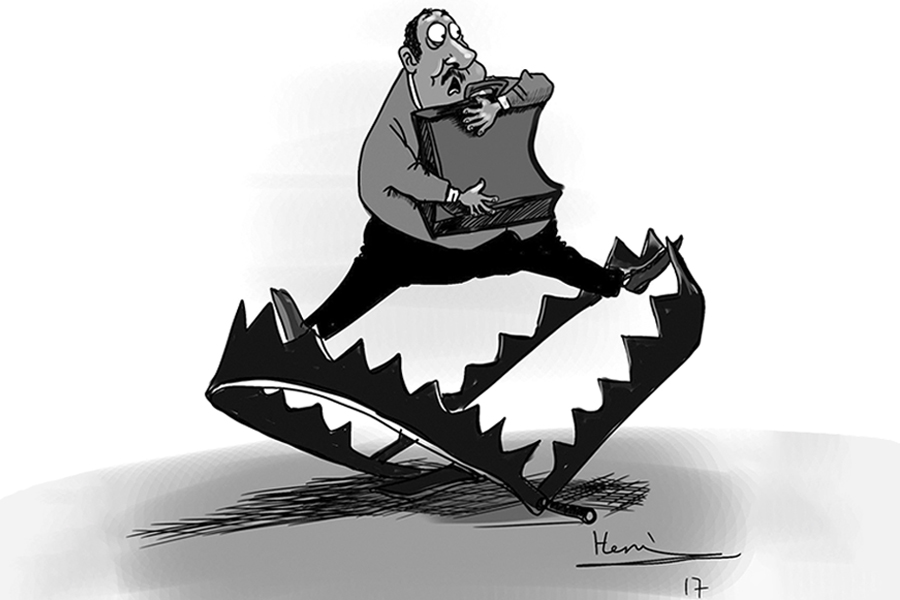
Radar | Apr 03,2023
Aug 20 , 2022
By Eden Sahle
These days, one does not need to be in the legal profession to come across crimes that end the victim’s life in heinous ways or change their life for the worst. Hearing about a brutal murder, rape or attempted murder is awful, and it is hard to learn that the punishment verdict is too soft.
Take the recent example of a man residing in one of the regional states who dismembered his wife and killed his neighbour. He was reportedly sentenced to a little more than a decade in prison. It is unimaginable.
Often, prisoners awaiting trial are seen mocking victims and their families at court compounds. It is not uncommon to hear them say, “I will get a decade for killing while eating government meals for free.” This is a disturbing statement, which seems to be not far from the truth. I come across many people publicly saying that they are willing to steal a lot of money in corruption schemes if the cost is "merely" a few years of incarceration.
Some prisoners leave jail without learning a lesson, and are often found committing crimes in another town or in the same communities. The life sentence of shunning the public gives them is harsher and more deterrent than the punishment offered by courts for their crime.
Prison terms are imposed to hinder the criminal from harming anybody else and as a deterrent for possible future crimes, teaching the public the consequence of the criminal actions. Ethiopia's law considers crime primarily as a violation committed either by commission or omission. It intends to ensure peace, order, and security for the public's good. The Ethiopian criminal code aims to put right the wrong done to victims through punishments ordered by courts.
Hence the law is focused on convicting the accused and punishing rather than making the offender accountable for the damage they caused and trying to undo the wrong, if not the crime. It does not encourage the offender to take responsibility to undo the wrong committed by performing positive actions towards the victim or the community at large.
Punishments imposed by the judge may vary depending on the nature and gravity of the crime, the circumstances of its commission, the offender’s guilty feeling, and admission or denial. Too often, sentencing goes against the law’s intention, favouring the remorseless offenders. Justice appropriately served eventually aims to mend the broken social ties with the intention of putting the offender back into society after serving a sentence. Lack of such application fails to bring lasting peace, allowing the practice of vengeance to thrive by the aggrieved victim families.
On top of this, there is a lack of a system to help victims of crime and their families recover from the massive damage caused. The Ethiopian criminal code excludes society from meaningful participation while crimes, directly and indirectly, affect them. It does not allow victim families to fully participate in the litigation process. Such a situation prevents them from making sure their interest and the damage to the victim are fully considered in the legal procedure.
Direct or indirect victims of the crime are not at the centre of the criminal justice system. Their role is limited to providing information or appearing as a witness. They have no say in the determination of the appropriate punishment to be imposed on the offender. They have no opportunity to address the convict and reconcile with the convict.
This makes the grievance continue between the victim’s families and the convict. Ex-convicts often flee their hometowns because they are not welcome by communities. The more they are pushed away, the more likely they will commit crimes again. Most convicts enter prison several times before they go in for long. It is especially common for robbers to serve just a few months after emptying the fruits of somebody’s years of hard work.
Offenders are feeling they are outsmarting the justice system. It should alarm courts as much as it does the victims' families and the public.
Criminal cases should not be handled differently in various jurisdictions of the towns and the capital city. Courts should not compromise the law’s intent for any reason. When adjudications are based on the due process of the law, then the public can trust the system, and offenders can rehabilitate by learning from their crimes.
PUBLISHED ON
Aug 20,2022 [ VOL
23 , NO
1164]

Radar | Apr 03,2023

Sunday with Eden | Apr 08,2023

Fortune News | Feb 18,2023

Editorial | Oct 26,2024

Commentaries | Jun 14,2025

Agenda | Jun 11,2022

Radar | Dec 12,2023

Radar | Oct 12,2019

Sunday with Eden | Apr 16,2022

View From Arada | May 11,2024

Photo Gallery | 178549 Views | May 06,2019

Photo Gallery | 168743 Views | Apr 26,2019

Photo Gallery | 159566 Views | Oct 06,2021

My Opinion | 137083 Views | Aug 14,2021
Commentaries | Oct 25,2025

Dec 22 , 2024 . By TIZITA SHEWAFERAW
Charged with transforming colossal state-owned enterprises into modern and competitiv...

Aug 18 , 2024 . By AKSAH ITALO
Although predictable Yonas Zerihun's job in the ride-hailing service is not immune to...

Jul 28 , 2024 . By TIZITA SHEWAFERAW
Unhabitual, perhaps too many, Samuel Gebreyohannes, 38, used to occasionally enjoy a couple of beers at breakfast. However, he recently swit...

Jul 13 , 2024 . By AKSAH ITALO
Investors who rely on tractors, trucks, and field vehicles for commuting, transporting commodities, and f...

Oct 25 , 2025
The regulatory machinery is on overdrive. In only two years, no fewer than 35 new pro...

Oct 18 , 2025
The political establishment, notably the ruling party and its top brass, has become p...

Oct 11 , 2025
Ladislas Farago, a roving Associated Press (AP) correspondent, arrived in Ethiopia in...

Oct 4 , 2025
Eyob Tekalegn (PhD) had been in the Governor's chair for only weeks when, on Septembe...

Oct 25 , 2025 . By YITBAREK GETACHEW
Officials of the Addis Abeba's Education Bureau have embarked on an ambitious experim...

Oct 26 , 2025 . By YITBAREK GETACHEW
The federal government is making a landmark shift in its investment incentive regime...

Oct 29 , 2025 . By NAHOM AYELE
The National Bank of Ethiopia (NBE) is preparing to issue a directive that will funda...

Oct 26 , 2025 . By SURAFEL MULUGETA
A community of booksellers shadowing the Ethiopian National Theatre has been jolted b...